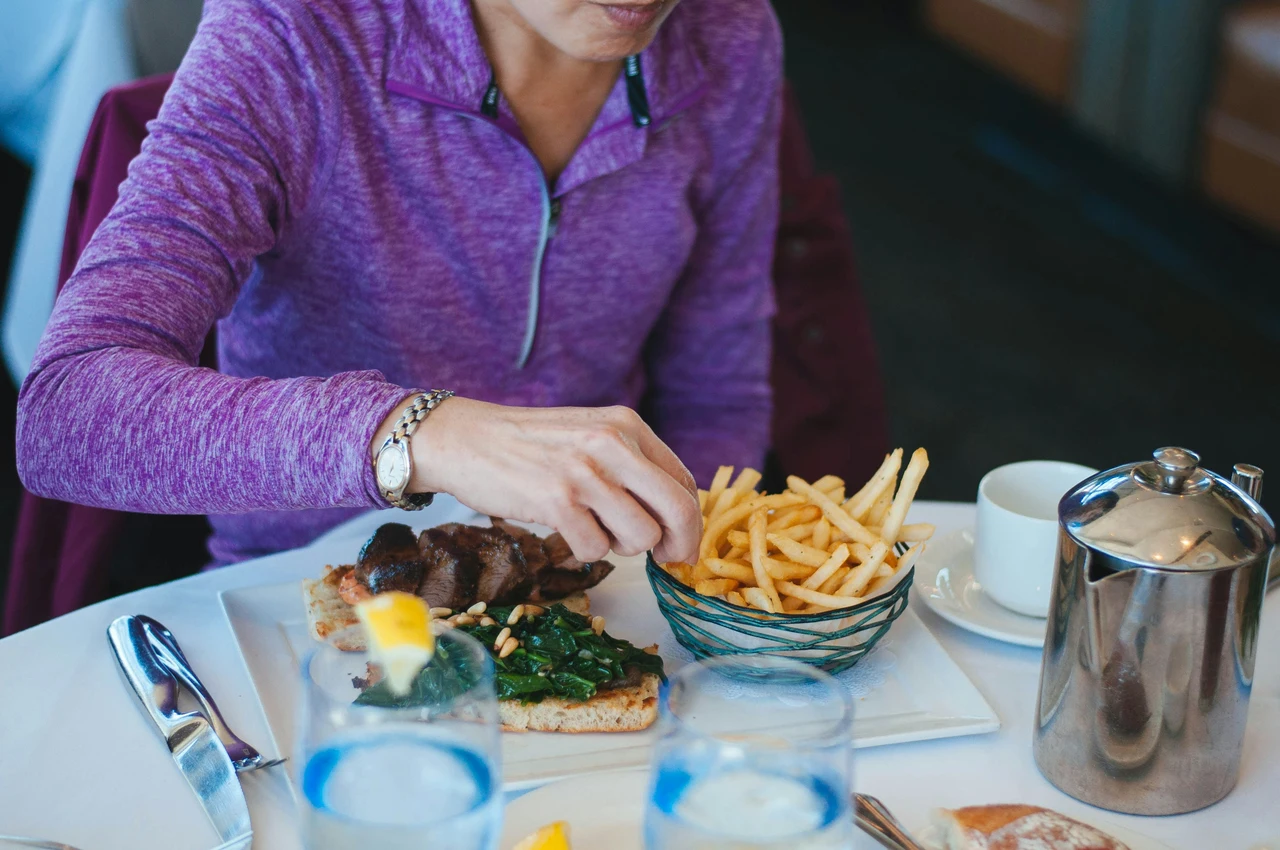Should Christians Go Out to Eat After Church on Sundays?
The familiar scene plays out in restaurants across America every Sunday around noon: families streaming in still dressed in their Sunday best, filling booths and tables after morning worship services. It's become such a cultural norm that many restaurants even offer special "after-church" menus and promotions. But should we, as followers of Christ, be participating in this tradition?
My husband Jake and I have wrestled with this question for years, and we've come to believe that our Sunday dining habits deserve more careful consideration than we often give them. While this isn't about legalism or adding burdens where Christ has freed us, it is about examining our hearts and considering how our choices affect others—particularly those who serve us.
The Heart of the Sabbath
To understand why this matters, we need to revisit God's intention for the Sabbath. In Exodus 20:8-11, the fourth commandment doesn't just tell us to remember the Sabbath day and keep it holy—it specifically mentions that no work should be done by anyone in our household, including servants and even foreigners within our gates. The principle extends beyond just our immediate family to encompass our sphere of influence.
Deuteronomy 5:14 reinforces this, stating that the Sabbath rest should extend "so that your male servant and your female servant may rest as well as you." The heart behind the Sabbath wasn't just personal spiritual renewal, but ensuring that everyone—regardless of social status—could experience the gift of rest that God intended.
While we live under the new covenant and aren't bound by Old Testament law in the same way, the principles behind God's commands often reveal His heart for justice, mercy, and human flourishing. The Sabbath principle speaks to God's desire for all people to experience regular rest and renewal.
The Modern Application
When we choose to dine out on Sundays, we're essentially asking others to work so we can enjoy convenience and fellowship. Restaurant servers, cooks, dishwashers, and managers are all required to be present and working while we're enjoying our post-worship meal. Many of these workers would prefer to spend Sunday with their own families or attending their own church services, if given the choice.
I've spoken with several restaurant workers over the years, and their stories are telling. Sarah, a server at a local family restaurant, shared that she's missed years of Sunday services because restaurants are often their busiest on Sunday afternoons. "I'd love to go to church with my kids," she told me, "but Sunday shifts pay too well to pass up, and someone has to work them."
Another server, Marcus, explained that many restaurants require certain staff to work Sundays as a condition of employment. While some establishments try to rotate Sunday shifts, the reality is that peak dining times require full staffing, limiting workers' flexibility to observe their own Sabbath if they choose to do so.
Examining Our Motivations
Before we dismiss this concern too quickly, it's worth examining why we dine out after church in the first place. Often, it's about convenience—we don't want to spend Sunday morning cooking and can't immediately prepare a meal when we return from worship. Sometimes it's about fellowship, extending the community we've experienced at church into a shared meal.
These aren't inherently wrong motivations, but they raise questions about priorities and preparation. Could we prepare meals on Saturday evening or earlier in the week? Are there ways to gather for fellowship that don't require others to serve us? Could we take turns hosting simple meals in our homes instead?
The convenience factor is perhaps the most challenging to address honestly. We live in a culture that prioritizes ease and immediate gratification. Asking ourselves to plan ahead and potentially sacrifice some convenience for the sake of others' rest requires intentionality that runs counter to cultural norms.
The Fellowship Factor
One of the strongest arguments for post-church dining is the fellowship it provides. Many churches are large enough that meaningful connection during service is limited, and sharing a meal creates space for deeper conversation and community building. This is a legitimate and valuable aspect of Christian life that we shouldn't dismiss lightly.
However, there are alternative ways to foster this fellowship that don't require others to work. Potluck meals at church, taking turns hosting simple gatherings in homes, or even organizing picnics in parks can provide the same community connection without requiring service staff to work.
Some might argue that restaurant workers are going to work anyway, so our individual choice doesn't matter. While it's true that restaurants will likely remain open regardless of our personal decisions, this reasoning troubles me. It's similar to saying that our vote doesn't matter because elections happen with or without us, or that our individual choices about consumption don't impact larger systems.
A Matter of Witness
There's also the question of witness to consider. Restaurant workers often deal with the Sunday lunch crowd's reputation for being demanding, impatient, and poor tippers—unfortunately, this reputation often extends to the church crowd. Whether fair or not, our behavior in restaurants immediately following worship services reflects on our faith and the genuineness of what we've just experienced in church.
If we do choose to dine out, how we treat service staff becomes a powerful testimony. Are we patient when service is slow because restaurants are understaffed on Sundays? Are we generous with our tips, recognizing that these workers are sacrificing their own potential rest for our convenience? Do we express genuine gratitude for their service?
Finding Freedom Within Boundaries
I want to be clear that this isn't about creating a new law or burden for Christians. We are free in Christ, and different believers may reach different conclusions on this issue based on their circumstances, convictions, and understanding of Scripture. A single mother working multiple jobs might need the convenience of Sunday dining more than a family with flexibility and resources to prepare meals at home.
The key is approaching this decision thoughtfully and prayerfully rather than simply following cultural norms without consideration. Are we dining out from genuine need, or from convenience and habit? Are we considering the impact of our choices on others, or only on ourselves?
Practical Alternatives
For those convicted to avoid Sunday dining out, there are numerous alternatives that can actually enhance rather than diminish the Sunday experience:
Saturday Preparation: Using Saturday evening to prepare slow-cooker meals, casseroles, or other simple dishes that can be ready when you return from church requires minimal Sunday morning effort while providing a home-cooked meal.
Potluck Fellowship: Organizing regular potluck meals at church or in homes distributes the work among many people and often results in more diverse and abundant food than restaurant dining.
Simple Sunday Meals: Embracing the idea that Sunday meals don't need to be elaborate. Sandwiches, soups, or breakfast foods can provide nourishment without extensive preparation or requiring others to serve you.
Saturday Evening Fellowship: Moving social dining to Saturday evenings when restaurant workers may have more scheduling flexibility, and when it doesn't immediately follow worship.
The Bigger Picture
Ultimately, this issue connects to larger questions about how our consumer choices align with our Christian values. Do we consider the working conditions and schedules of those who serve us? Are we mindful of how our demand for convenience affects others' ability to rest, worship, and spend time with family?
These questions extend beyond Sunday dining to many areas of modern life, but Sunday presents a unique opportunity to live counter-culturally in small but meaningful ways. By choosing to prepare our own meals or gather in homes instead of restaurants, we make a quiet statement about what we value and whom we consider in our decisions.
This doesn't make us more righteous than those who choose differently, but it does offer an opportunity to align our actions more closely with the heart of the Sabbath principle—ensuring that others, not just ourselves, can experience rest and renewal.
As Jake and I have made this adjustment in our own lives, we've found that our Sundays have become more peaceful and intentional. The time we once spent waiting for tables and meals is now spent in conversation, rest, or additional time in Scripture. Our fellowship hasn't diminished—it's simply taken different, often more meaningful forms.
The question isn't whether dining out after church is sinful, but whether it's the most loving choice we can make for both ourselves and those who would serve us. In a world that prioritizes convenience and personal preference, choosing to consider others' rest might be one small way we can live as salt and light, demonstrating the kingdom values we've just heard proclaimed in worship.

